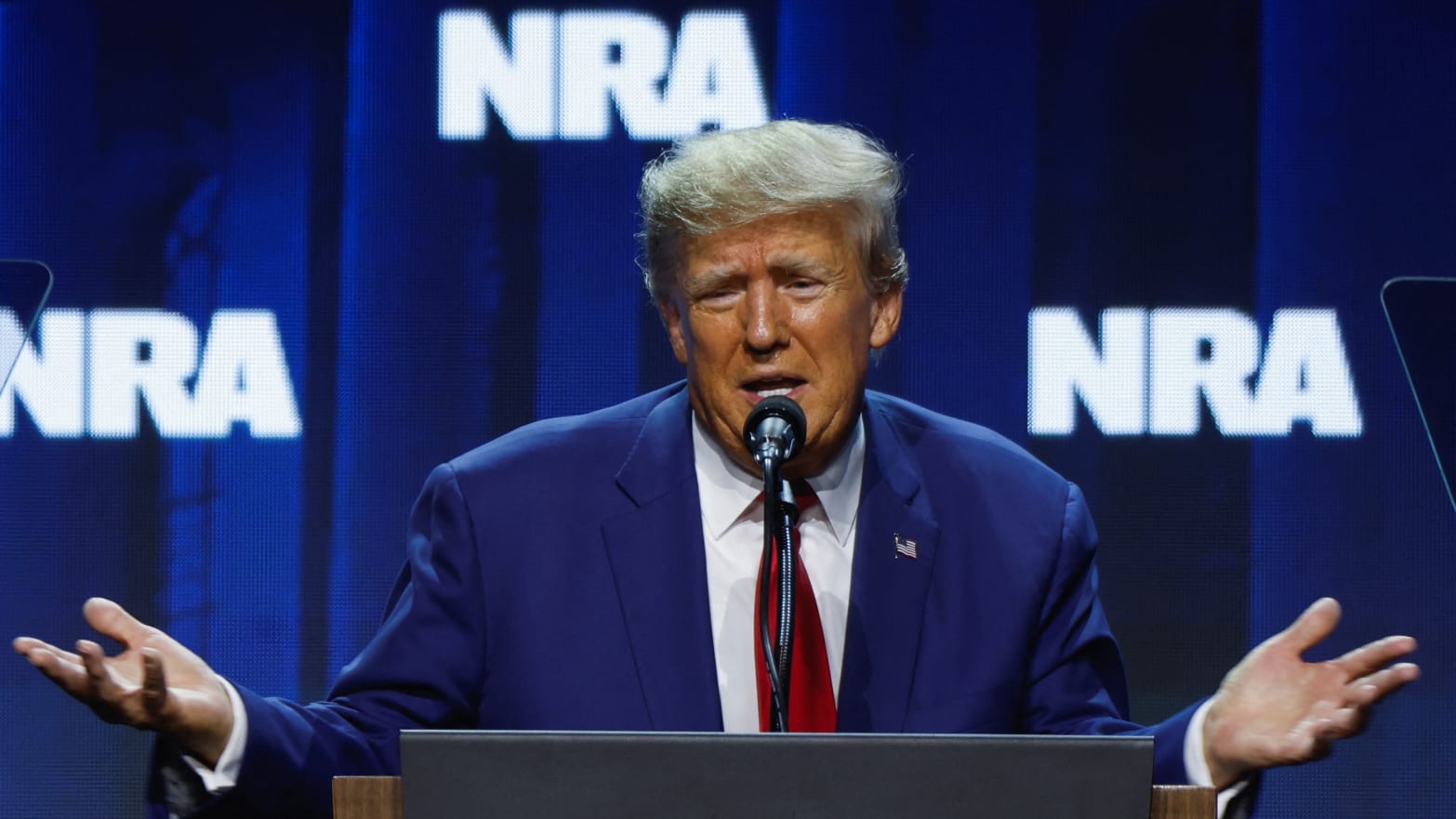As the Manhattan District Attorney prepares to hand over huge tranches of evidence to Donald Trump, a New York state judge on Tuesday gently warned the petulant former American president against continuing his incendiary campaign against law enforcement and the courts.
“It's certainly not a gag order. It’s certainly not my intention in any way to impede Mr. Trump's ability to campaign… he’s certainly free to deny the charges… he’s free to do just about anything that doesn’t violate the specific terms of this protective order,” Judge Juan Merchan said from the bench in front of a packed courtroom of attorneys and journalists, as Trump tuned in via video feed from Mar-a-Lago.
Merchan was referring to a protective order he signed two weeks ago that guards sensitive documents prosecutors are turning over to Trump and his legal team. Defense lawyers need the evidence in those records to fight back against the 34-count grand jury indictment that accuses Trump of faking business records in order to hide his hush money payment to the porn star Stormy Daniels in 2016, a scheme that saved his first successful presidential campaign from potentially dire embarrassment.
But while Merchan avoided lecturing the former president, he did caution that ignoring the judicial order could still land Trump in serious legal jeopardy.
“Violation of a court order or a court mandate could result in sanctions. There are a wide range of sanctions, but it could include up to a finding of contempt, and that is punishable,” Merchan said, choosing painfully oblique phrasing to warn Trump he could face fines or jail.
It was a clear shot at the real estate tycoon, who has used his cult-like status in the Republican Party and his MAGA megaphone to broadcast veiled threats against District Attorney Alvin Bragg, prosecutors on his team, and even Merchan himself.
Nevertheless, it only took an hour after the proceedings ended for Trump to begin prodding at the judge again on social media with a post that didn’t seem to violate the order—but still served to goad the judge nonetheless.
“Just had New York County Supreme Court hearing where I believe my First Amendment Rights, 'Freedom of Speech,' have been violated, and they forced upon us a trial date of March 25th, right in the middle of Primary season. Very unfair, but this is exactly what the Radical Left Democrats wanted. It’s called ELECTION INTERFERENCE, and nothing like this has ever happened in our Country before!!!” he wrote on Truth Social.
The awkward power dynamic on display in the New York City courtroom Wednesday is a microcosm of what Americans face in the months to come as several criminal investigations finally zero in on Trump: an unencumbered politician who relentlessly taunts the country’s justice system while judges use tempered language to tactfully exercise the legal authority they claim to have.
Adding a tinge of dramatic flare—and tension highlighting the competing powers—Trump was seen sitting behind a desk, flanked by two American flags and perched next to his lawyer. Trump wore a frown, a dark blue suit, and a striped red tie. He stared into the camera while keeping his hands clasped together over a document.
Tuesday’s court hearing itself was an oddity, as it was a normally unnecessary affair that merely served to formally read Trump a judicial order he could have seen himself—or had his many lawyers describe to him. But Merchan, cognizant that the former president has recently shown he couldn’t care less about supposed restrictions, took the added precaution of speaking directly to Trump himself—while adopting a light touch approach to avoid making it something of a spectacle with a public lecture.
Trump appeared on a computer screen, joined by his lead defense lawyer Todd Blanche from the mogul’s mansion in Palm Beach. His other defense lawyer, Susan Necheles, sat at a table in court opposite Bragg’s team of prosecutors.
During the brief court hearing, Blanche lightly pushed back against the judge's decision, noting that "because President Trump is running for president of the United States and is the current leading contender... he's very much concerned that his First Amendment rights are being violated by this order."
But the order doesn't say anything that would stop Trump from merely complaining about the case—or continuing to call it a political farce.
In his May 8 order, Merchan wrote that any evidence turned over by the DA “shall be used solely for the purposes of preparing a defense,” forbidding Trump or anyone else who gets them from posting them online—even singling out Truth Social, Trump’s own platform. And the judge went so far as to limit Trump’s ability to see the evidence himself, ordering that he is “permitted to review the limited dissemination materials only in the presence of defense counsel.” The restrictions are aimed at stopping Trump from ramping up the norm-shattering tactics he’s adopted in recent weeks.
In late March, when Trump began to feel the legal pressure as Bragg’s team neared the end of their presentation before the Manhattan grand jury, Trump actually warned of “potential death & destruction” if he was indicted. He posted a photo mashup that appeared to show him wielding a bat over Bragg’s head. The image inspired his Make America Great Again followers to flood the DA’s office with threatening messages, according to a source in that office.
Then, after being indicted on March 30, Trump focused his rage on a lead prosecutor on that team, Matt Colangelo, whom he labeled “a top Democrat DOJ official.” That served as a green light to his loyal adherents in Congress, where House Judiciary Committee Chairman Jim Jordan (R-OH) quickly fired off a letter demanding that the prosecutor interrupt his ongoing investigation to testify about how he got hired—a thinly veiled ploy to further the conspiracy theory that President Joe Biden is somehow behind Trump’s New York indictment.
Then, in a jaw-dropping show of contemptuousness mere hours after his arraignment in court in New York, Trump ignored Merchan’s calmly delivered warnings about avoiding incendiary personal attacks and delivered a caustic speech at his Mar-a-Lago estate in South Florida.
“This is where we are right now. I have a Trump-hating judge, with a Trump-hating wife and family, whose daughter worked for Kamala Harris and now receives money from the Biden-Harris campaign,” Trump said that evening.
Trump already has a history of targeting judges he doesn’t like, with the most memorable being his infamously racist tirade in 2016 against U.S. District Judge Gonzalo P. Curiel, who he deemed incapable of ruling fairly simply because the California federal judge was of Mexican heritage.
But Trump has been on an all-out campaign of insolence lately, most recently when he ignored a New York federal judge’s repeat warnings during his civil rape trial against the journalist E. Jean Carroll. Trump and his eldest son, Don Jr., posted rants on social media about the case and the jury—even to the point of potentially causing a mistrial—despite U.S. District Judge Lewis Kaplan’s stern admonitions in court.
He’s even kept it up after losing the trial and being ordered to pay $5 million for defaming the woman he was found to have sexually abused. During a CNN town hall earlier this month, he continued to bash Carroll—sparking yet another slew of defamation claims from Carroll and her lawyers—and on Tuesday morning he twice posted on Truth Social about what he called a “scam” of a case.
On Tuesday, the judge overseeing the Manhattan DA's case officially set the first-ever criminal trial of a former president to start on March 25, 2024—at the very height of Republican presidential primaries. That means Trump could find himself preparing for trial the same week he faces key scheduled elections in Arizona, Florida, Illinois, and Ohio.

